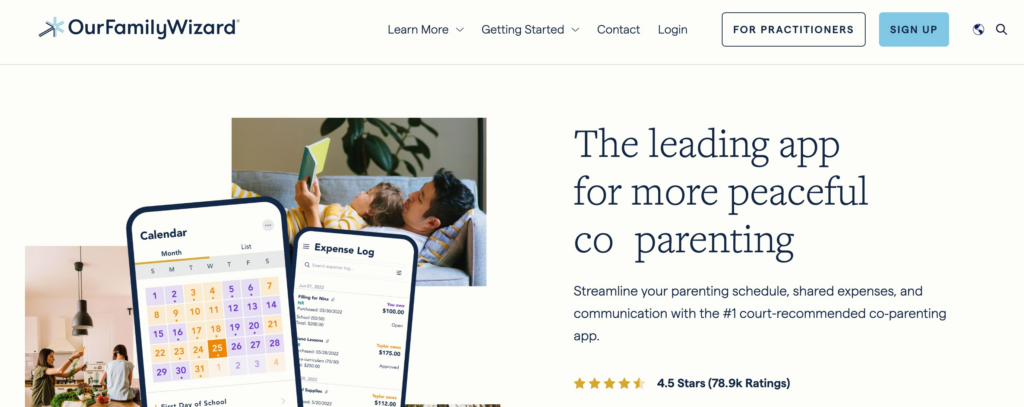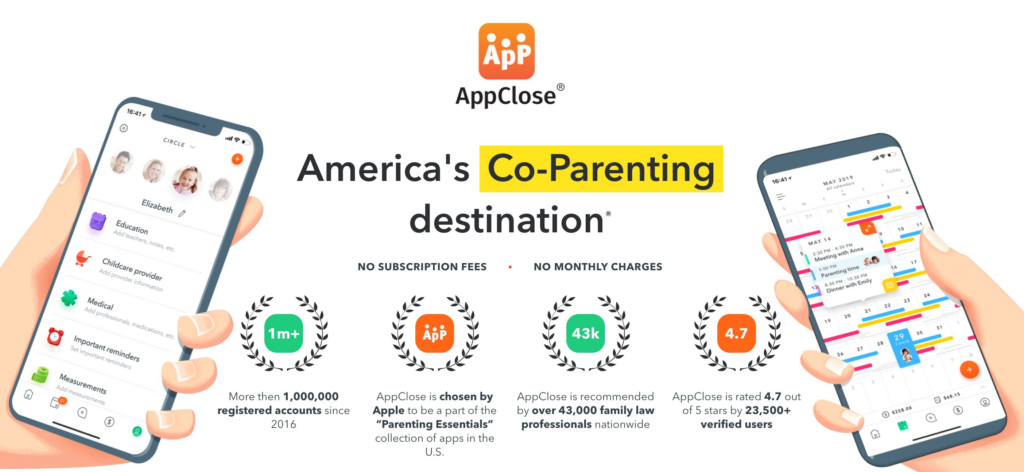Here are some of the top recommended court-approved parenting apps:
- Our Family Wizard (paid subscription)
- Talking Parents (offers free and paid subscriptions)
- Custody X Change (offers free and paid subscriptions)
- WeParent (Paid subscription)
- 2Houses (Paid subscription)
- AppClose (Free)
- CoParenter (Paid subscription)
- Fayr (Paid subscription)
One of the popular apps, CoParenter, was co-created with the help of former Californian judge Sherril A. Ellsworth.
Ellsworth notes that innovations like this are “making our courts more accessible and efficient” in addition to “empowering parents.”
Co-parenting apps take the guesswork out of documenting, financial responsibilities, scheduling, and many other overwhelming aspects of shared parenting including communication!
Ultimately, the suitability of a co-parenting app depends on the specific needs and preferences of the co-parents involved.
Table of Contents
Free Court-Approved Parenting Apps
Co-parenting apps are increasingly being used in court to help the custody and co-parenting relationship go more smoothly for everyone involved.
If you don’t want to pay for an app to help manage co-parenting, you don’t have to spend a penny.
There are free options that offer all you need, and they are still accepted in court.
1. AppClose
This is an app that family courts across the US are recommending in place of more expensive alternatives to remove the extra financial burden.
AppClose allows you to not only manage the parenting calendar but also keep a record of calls, messages, and any other communication with the people in your AppClose circle.
You can even manage financial paperwork needs using this app.
Having this type of information saved and in an unchangeable form can be a lifesaver when you do need proof or documentation.
Key Features:
- Ability to save conversations in case they are needed in court
- Easy way to request calendar changes
- Function for exporting records
2. Talking Parents
With a high user satisfaction rating and over 550,00 downloads, Talking Parents takes care of co-parenting needs with ease.
Besides communicating with your co-parent with secure time-stamped messages for complete transparency, you can also request money, keep a personal journal, and document important interactions.
Peruse the parenting resources for free tips on a variety of topics. It also gives you the option to upgrade your plan based on your needs.
Key Features:
- Create a library of cards with important contact numbers
- Keep a private journey that your co-parent can’t see
3. Custody X Change
Use Custody X Change on your computer or phone to track schedules through their intricate calendar.
While this lacks the bells and whistles of other options, it’s still a great resource when trying to coordinate plans and is a great pick if more intricate apps seem overwhelming.
Note that the app is only available for download via the Custody X Change website, not through your phone’s app store.
Key Features:
- Use on your computer or mobile device
Paid Court-Approved Parenting Apps
If the free options don’t have all you need, there are paid court-approved parenting apps sure to check off your list of wants.
In fact, some of the free apps mentioned above have packages you can pay for if you want extra perks.
Note: Prices listed are current at the time of this writing but are subject to change.
1. Our Family Wizard (I personally use and love this app)

The Our Family Wizard app feels like magic with the Info Bank that allows those who use it to see everything from medical records to allergies.
It has calendars, ways to handle finances, and plenty of options for communication at a reasonable price.
With all this information at your fingertips, you can communicate with your co-parent only when you want to, which can ease tension.
Key Features:
- The ToneMeter feature with this app helps flag disrespectful messaging comments before you send them. You get to take a breath and rephrase to keep communication civil.
Pricing Plans:
- Choose Your Own Plan – based on features you want/need
- Essentials Plan – most popular option ($12.50/month)
- Premium Plan – has extra features for only a few dollars more per month ($18/month)
2. Talking Parents
Try the free plan and then move to a standard or premium plan if you find you want more. The paid plans come with the option for video calls, PDF record storage, Info Library cards, and more.
Key Features:
- Attachment library to easily access information
- Vault file storage
Pricing Plans:
- Free Option – website access only
- Standard Plan – many more features than free option ($9.99/month)
- Premium Plan – includes useful bonus features ($24.99/month)
3. Custody X Change
The paid-for version of the Custody X Change app has the tools to help you create a fully fledged legal parenting plan from calendars and time tracking features to professional-quality printouts and event recording.
Like some of its competitors, the app’s communication system can also detect hostile language, prompting you to rethink and reframe before hitting send!
Key Features:
- Activity notifications
- Get help creating a parenting plan using this app
Pricing Plans:
- Free Plan – free trial period but limited use of features
- Silver Plan – scheduling, creating parenting plans, activity notifications, and more ($8/month)
- Gold Plan – additional tracking, financial, and scheduling features ($12/month)
4. CoParenter
Besides offering great planning and communication tools, CoParenter also lets you work with a mediation team online to deal with issues as they arise.
There is also the option for coaching support, and check-ins show you where your child is and give you peace of mind when they are with the other parent.
Key Features:
- Online mediation
- Self-help library
Pricing Plans:
- Free 30-day trial
- Pay by the month ($8.99-12.99/month)
- Pay by the year
- Pay by the year for both parents
5. WeParent
WeParent isn’t just for those who are co-parenting after a separation or divorce.
You can use this app with your entire family or friend group, including people who don’t live in the home.
It’s also a great tool for married partners who just need help managing their kids’ appointments and calendars.
Due to the entire-family access, you can ensure everyone’s appointments and needs are placed in the notes to keep your crew on the same page.
Key Features:
- Whole family access
- The option for a lifetime access
Pricing Plans:
- Free for the first 14 days
- Pay by the month ($9.99/month)
- Pay by the year
- Pay for an entire lifetime
6. 2Houses
Use this secure platform to share life with another parent.
Receive notifications tailored to your preferences, and track finances and calendar events easily.
Color code the calendar for each person in the family, and check out blog posts aimed at making your separation or divorce easier to navigate.
Key Features:
- Get notifications for different activities
- Create photo albums to share
Pricing Plans:
- Free 14-day trial
- Low-cost monthly plan that covers the entire family ($11/month)
7. Fayr
Keep track of custody information, documentation, and appointments with Fayr.
Though some deem it to be more of a child-custody app than co-parenting app, it is still court-approved with plenty of features to make it worthwhile.
You can even check your parenting report to ensure you are keeping up with documentation and appointments.
Note that app signup is only available through the Fayr website, not via a traditional app store.
Fun fact: Gwyneth Paltrow is Fayr’s Head Advisor!
Key Features:
- Geo-location log
Pricing Plans:
- Low-cost monthly plan ($9.99/month)
Which Co-Parenting App Is the Best?
Determining the “best” co-parenting app for you depends on your specific requirements and the dynamics of your co-parenting situation.
OurFamilyWizard is often recommended by family law professionals and is known for its reliability and comprehensive features such as tools for communication, shared calendars, expense tracking, and a journal for documenting key information.
How Co-Parenting Apps Work
Both parents download the recommended app and connect their accounts.
From there, you’re encouraged to keep in contact with your ex-partner or co-parent (these apps apply to couples who are married, unmarried, or even still living together in birdnesting arrangements).
You can use these apps by personal choice or as part of a court mandate.
Either way, regular communication in matters of your children helps to reduce drama and friction as events, messages, and parenting plans are presented clearly for both parties to view and discuss in real-time.
Pros & Cons of Using a Parenting App for Court Communication
No parenting app is perfect. Each one has unique benefits and disadvantages, but you’ll find that the pros of using an app over going without one typically outweigh any drawbacks.
Pros
- Communication & reduced conflict: Co-parenting apps facilitate communication between parents in a centralized, organized manner. This can help reduce misunderstandings and the dreaded pitfalls of “he said/she said.”
- Documentation: Many apps allow for documenting important information, such as custody schedules, expenses, and communication history. This can be valuable for legal purposes or simply for keeping track of parenting responsibilities.
- Scheduling and calendar features: Got bizarre working schedules? No problem. Apps often come with scheduling tools and shared calendars, making it easy to coordinate visitation schedules and important dates, no matter the circumstances.
- Expense tracking: Some apps include features for tracking shared expenses related to the children, which can help maintain transparency and fairness in financial matters.
- Security and privacy: Many co-parenting apps prioritize the security and privacy of user data, ensuring that sensitive information about the children and the co-parenting arrangement remains secure.
Cons
- Cost: While some co-parenting apps offer free versions, others may have subscription fees. This cost can be a drawback for some users, especially if they are on a tight budget.
- Learning Curve: Introducing a new technology can be challenging for some individuals, especially those who are not tech-savvy. The learning curve of using a co-parenting app may be a barrier for some parents.
- Dependence on Technology: Relying solely on a co-parenting app for communication can be limiting. It may not suit all communication needs, especially when more nuanced or sensitive discussions are required.
- Accessibility: Both parents need to have access to and be comfortable using the app. If one parent is unwilling or unable to use the technology, it almost defeats the purpose.
- Technical Issues: Like any software, co-parenting apps may experience technical issues or downtime. Reliability can be a concern, especially if both parents heavily depend on the app for communication and coordination.
Things To Look for in a Co-Parenting App
You should always research the features of a parenting app before making a final decision.
Also, double-check that the one you are considering meets any and all court requirements.
Security and Privacy
Ensure that the app prioritizes the security and privacy of your data.
Information related to your children and co-parenting arrangements should be kept confidential and secure.
User-Friendly Interface
The app should be easy to navigate and use, especially since both parents will need to interact with it.
A user-friendly interface can help reduce frustration and facilitate effective communication.
Child-Friendly Features
There’s every chance your children may be curious about using the app too.
Make sure the app is safe and secure for them to use and will not put their safety and privacy at risk.
Need to speak with a specialist?
Consult a professional child support lawyer within minutes to get an answer to your questions and concerns about co-parenting.
Mom of three (including identical twin boys), wife, and owner of Parents Wonder. This is my place to share my journey as a mother and the helpful insights I learn along the way.


